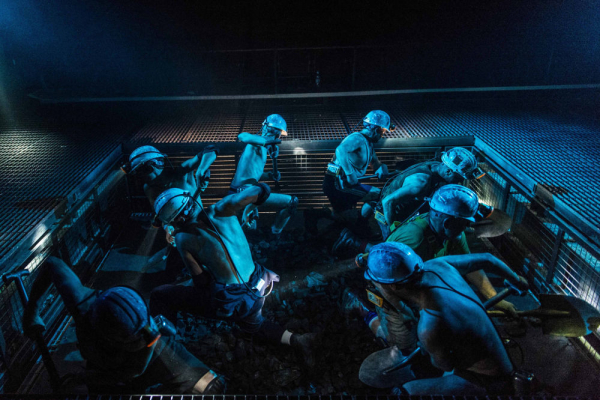Wonderland (Hampstead Theatre)

In between, the play unfolds in two well-controlled narratives: the induction of two new apprentices in the Welbeck Colliery in Mansfield (where Steel's father has worked for 35 years) and the growing mood of resistance; and the policy-making tussle between the new head of the National Coal Board, Ian MacGregor (Michael Cochrane), and Mrs Thatcher's "wet" energy secretary Peter Walker (Andrew Havill).
Although the physical action in Edward Hall's production, with choreography by Scott Ambler, explodes in the flashpoint of the battle of Orgreave, where miners' leader Arthur Scargill's flying pickets were brutalised by police with riot shields, the careful assembly of facts and arguments rather works against dramatic concentration.
Time lends distance to the proceedings, but also drains them of immediacy, despite the "Coles Notes" historical references to the three-day week and the three million unemployed, the riots in Brixton and Toxteth, the killing of Yvonne Fletcher (neatly dove-tailed with the political consequences in the oil supplies from Libya) and the IRA bombing of the Brighton hotel.
“Time lends distance to the proceedings, but also drains them of immediacy”
“Time lends distance to the proceedings, but also drains them of immediacy”
The trigger to the crisis was the closure of 20 inefficient pits and the loss of 20,000 jobs. But as Steel even-handedly observes, this might have been acceptable as a necessary way of maintaining the vigour of the successful mines.
That ideological tension is indicated, not dramatised, then dropped as we move on to the strange story of David Hart (Dugald Bruce-Lockhart), a Thatcherite socialite posing as a journalist who infiltrated the strike with a "back to work" campaign while living in Claridge's hotel; this could have been another, and more intriguing, play in itself.
Hall and Hampstead have not stinted on presentation. The theatre is reconfigured once again, with a section of the audience sitting on a large grilled area (you are advised not to wear high heels, so I didn't) – the stage built out into the auditorium – which is the colliery itself, complete with the awesome machinery in Ashley Martin-Davis' design of a wide gantry, hydraulic steel cage and a large practical trap.
At times, the show seems a pale echo of those Bill Bryden all-male tribal epics of the era, the miners swaggering about in helmets and grimy torsos, even stripping off for a half-lit shower scene, and belting out their anthems arranged by musical director Simon Slater, who doubles as the pit manager, alongside Nigel Betts' senior pitman.
As a more detailed reminder of what's going on in the background of the mock agitprop scenes in Billy Elliot, Wonderland is a valuable addition to the London list. But it also reeks slightly of cold potatoes, and Beth Steel, obviously a coming talent, needs to loosen up and let rip, perhaps more along the lines of Richard Bean in Great Britain.











